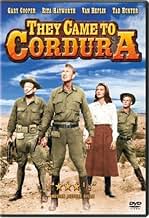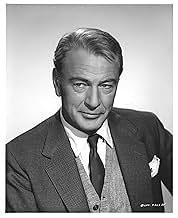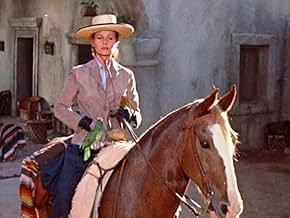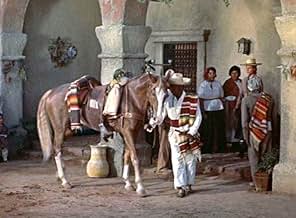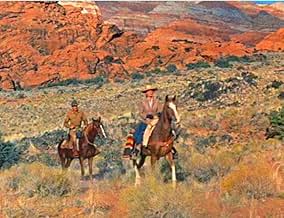अपनी भाषा में प्लॉट जोड़ेंAn army major, himself guilty of cowardice, is asked to recommend soldiers for the Congressional Medal of Honor during the Mexican Border Incursion of 1916.An army major, himself guilty of cowardice, is asked to recommend soldiers for the Congressional Medal of Honor during the Mexican Border Incursion of 1916.An army major, himself guilty of cowardice, is asked to recommend soldiers for the Congressional Medal of Honor during the Mexican Border Incursion of 1916.
- निर्देशक
- लेखक
- स्टार
- पुरस्कार
- 1 जीत और कुल 1 नामांकन
- Capt. Paltz
- (as James Bannon)
- Cavalry Trooper
- (बिना क्रेडिट के)
फ़ीचर्ड समीक्षाएं
The flaws may be real, but they might not be the fault of the filmmaker (writer-director Robert Rossen).
Reportly, the film was taken out of Rossen's hands by the studio and drastically cut and re-cut. The director's original version, about 1/2 hour longer, was apparently much better, making much more dramatic sense.
Further, the movie was shot in CinemaScope, and comments on its poor cinematography and editing are likely based on viewing a crude pan & scan video copy. Such artificial flaws are common with panned & scanned widescreen movies.
.
Set in 1916, the film centres on a US military expedition deep into Mexico, a punitive response to Pancho Villa's raid on American territory. Gary Cooper plays Thorn, and though he invests his character with a certain quiet dignity, he can hardly be accused of acting.
Thorn is despatched back to the USA with a small group of men, each of whom is to be decorated for valour. As the Cavalry's Awards Officer, Thorn will have to prepare citations, and he obsessively quizzes the men about why they did what they did, how they felt at the time, and so forth.
Typically for a film of its era, "Cordura" assembles a melange of ethnic tokens, throws them into a difficult situation, then concentrates on the tensions and confrontations which result. Richard Conte is Truby, the crafty latin type, and Van Heflin plays Chawk, the angosaxon brute. Dick York is Renziehausen, the German American from (where else?) Wisconsin. Thorn is hoping to learn the secret of courage from his motley crew, but discovers that the answer to his question can only be found within himself.
Nice angles are developed to open out the plot's basic premise. A cavalry charge against the Mexicans looks like dashing American heroism, but might be no more than cynical fakery on the part of medal-hunting Colonel Rogers. Chawk might be an unfeeling ruffian rather than a hero. The arrival in the group of Mrs. geary (Rita Hayworth) complicates the issues, because the presence of a beautiful woman causes the men's interests to diverge.
The Mexican terrain is spectacular, and the film's central proposition is an interesting one, but the end product is so-so. It is difficult to warm to Cooper as an actor, or indeed to his character. Tab Hunter (as Lieutenant Fowler) goes way over the top. Thorn's sudden perking-up beside the rail track is a ludicrous event.
Verdict - Would-be essay on the wellsprings of human courage peters out into humdrum adventure yarn.
After contact with the enemy, and after losing many men, five men were nominated for the Medal of Honor. Since the army needed living heroes to prepare the nation for its likely entry into WWI, Major Thomas Thorn (Gary Cooper), an awards officer, escorts the nominees, Lt. William Fowler (Tab Hunter), Sgt. John Chawk (Van Heflin), Cpl. Milo Trubee (Richard Conte), Pvt. Andrew Hetherington (Michael Callan), and Pvt. Renziehausen (Dick York), back to headquarters. This film is the story of that journey, and Thorn's exploration of the character of heroes.
Adelaide Geary (Rita Hayworth), an American woman who owns the ranch where the battle was fought, is sent back with them on charge of treason for aiding Villistas against American soldiers, even though she had no choice.
Although Hayworth and Cooper both gave impressive performances, Van Heflin was the standout as a brutish sergeant, especially since he was acting against type, having played decent men forced into heroism during his best-known films, Shane (1953) and 3:10 to Yuma (1957).
Despite pretty much ignoring the interesting history that serves as a backdrop to this film, this is actually still quite an interesting film that was a lot rawer than I expected it to be, given the period in which it was made. In the early stages it was too basic and I worried that the whole thing would be as clunky as Thorn's early questioning of some of his "heroes", but gradually it got better as it went on and simple lines such as hero and coward were eroded away. This is not to say it is brilliant because it most certainly is not but it is certainly interesting for what it tries to do. It doesn't help that the script really labours the surface but lacks the ability to go significantly deep to really make an impact. However even with this, it was still interesting enough to hold me and I did enjoy the solid if simplistic moral debate that it delivered.
Rossen and his cinematography do great work with the wide-open landscapes but the former must also carry the can for not bringing more emotion out of the script consistently. As a result the cast do well without really excelling with nobody guiding them deeper, this is really what I could have expected. Cooper is as solid as usual with what I suppose was a brave role for him to take. He deals with it well but perhaps wasn't good enough to really convince in layers although he is superficially good enough. Hayworth doesn't have that great a character and her delivery occasionally gets a bit too over-the-top when asked to deliver more emotionally charged material, she has impact but I was looking for more pain and fear. The support cast work well with what they have been given to do. Conte, Heflin, Keith and Hunter are among those giving solid turns in support of Cooper and the raw story.
Overall then this is not a great film but it is an interesting one. Despite being over 45 years old it is surprising raw and willing to turn away from the simple lines of courageous and cowardly towards something that is much realer and well conceived. It doesn't go deep enough but it is strong on the surface could easily have been tighter and dropped 20-30 minutes from the running time but is still worth a look for what it does do well.
In 1916, while World War I was occupying most people's attention, President Wilson was concerned with the continuous unsettled state of Mexico, then in the sixth year of it's Revolution. Initially he was delighted with the first head of the Revolution, Francisco Madero, who was trying to make the country a nation ruled by constitutional law. But in 1913, Madero was overthrown and murdered by the head of the Mexican army, General Huerta. Huerta had support by the then Ambassador to Mexico, a gentleman named Henry Wilson (no relation to the then President-elect), who openly cooperated in the assassination. After Woodrow Wilson was inaugurated, he replaced Henry, but the damage was done to Mexican-American relations. The new President was too ham handed to improve matters. In 1914 he had the Marines land at Vera Cruz after our flag had been insulted. Many lives were lost in this battle. Wilson worked to force Huerta out of his office. This brought him into considering someone to replace Huerta.
Why a puritanical prude like Woodrow Wilson thought of supporting Francisco "Pancho" Villa as the corrective to Huerta has never been adequately explained. Although the two men never met, it is inconceivable that Wilson would have found the hard drinking, bloody minded, and woman chasing Pancho as an ideal type to run Mexico. But he did, and for a year or so (until Huerta left Mexico) Villa was given arms and supplies from the U.S. This honeymoon lasted until a new figure arose - General Venusiano Carranza. Carranza (like Madero) wanted the adoption of a permanent national constitution to run the country. Wilson liked this (he did not notice that Carranza did not hesitate to feather his own nest while stressing the constitution. So in 1916 Wilson began aiding Carranza, and slowly ceased assisting Villa.
Villa was angered by this, and decided to teach the gringos a lesson. He raided the town of Columbus, New Mexico, killing about a dozen citizens. It was the first foreign invasion of American soil since the War of 1812, and would be the only invasion of the continental territory of the U.S. between 1814 and 09/11/2001. Wilson was furious, and demanded that President Carranza arrest the bandit/revolutionary. Wilson might as well have demanded that Carranza arrest the winds of Mexico. He had fought several battle against Villa, and knew that Pancho was no pushover. When Carranza gave some half-baked reason for not catching Pancho, Wilson decided to take the matter into his own hands: he sent troops into Mexico under General John J. Pershing to catch the bandit revolutionary. For a year or so Pershing tried to catch Villa, but the wily Pancho managed to keep escaping. Finally the U.S. troops were called back. Mexicans were incensed at American arrogance in invading their country (sound familiar?). The only good thing was that it enabled us to test our army out here, under if's future Expeditionary Commander's leadership, before we went into the European conflict.
Except, possibly, "The Three Amigos", this is the only commercially made film that is set in the Anti - Villa expedition of 1916 - 1917. As such it barely touches the reasons for the expedition. Instead it concentrates on Gary Cooper's assignment to find five men who should receive the U.S. Medal of Honor for gallantry and bravery in action. It is a cynical act by Washington, because 1) the purpose is public relations cosmetics for a botched armed intervention; and 2) Cooper's Major Thorn is actually given the assignment because he acted cowardly on the field of battle. For the Major to be given this quiet assignment is actual an insult - his own courage is being questioned.
Soon he finds a battle going on and picks out his five men (Van Heflin, Richard Conte, Michael Callan, Tab Hunter, and Dick York). This gives him some problems with an old friend, Robert Keith, who planned the attack, and hoped it would lead to him getting the award (actually, Cooper was only impressed at how slapdash and badly planned the attack was, and cannot think of it's architect getting any type of award as a result). Keith ends his friendship with Cooper as a result.
Taking his five men with him, Cooper starts trying to get to know them. He soon discovers that the men are not interested in the medal, and (as they have a long trek to Cordura, where they have to go to finalize the awards), Cooper learns that the men are not very noble at all. To worsen things, they capture a hacienda owner who is American (Rita Hayworth), who gave assistance to Villa's men. The woman reawakens sexual tensions and rivalries between the five men, as well as Cooper.
The film ends with Cooper and the men coming to turns (after several nearly deadly confrontations) with their own views of the values of true courage and it's being honored. It is not a dull matter, but one questions a full two hour about it. Because of the covering of this dismal incident of the diplomatic history of the U.S. and Mexico, and the acting (all the leads are good), and Rossen's direction - it is worth a "7" out of "10".
क्या आपको पता है
- ट्रिवियाAlthough Gary Cooper was 57, his character Major Thorn was forty years old according to the novel. Early in the film it is mentioned that Thorn's father had recently been killed while still on active service.
- गूफ़Major Thorn improperly salutes Colonel DeRose in the opening scene when he is dismissed. He should have saluted and held his salute until it was acknowledged. Instead, he lowers his arm even before Colonel Rose acknowledges it.
- भाव
Major Thomas Thorn: Did you ever see the Medal of Honor?
Private Renziehausen: No, Sir.
Major Thomas Thorn: It's the most beautiful decoration of all, as it should be. I'd trade an ear for one any time, two in fact.
Private Renziehausen: Excuse me, Sir, but I'd rather have the ear.
- क्रेज़ी क्रेडिटOpening credits prologue:
On the night of March 8th, 1916, a large mounted force of Mexican rebels under Pancho Villa crossed the American Border and attacked the town of Columbus, New Mexico, killing and wounding both American civilians and soldiers.
As a result of this action,the United States Army sent an expedition into Mexico with orders to capture Villa and disperse his forces.
It was during this campaign that one man, an United States Army officer,was forced to come face to face with two of the great fundamental questions that affect mankind:
What Is Courage? What Is Cowardice?
This is the story of his search for an answer.
- कनेक्शनFeatured in Stars of the Silver Screen: Rita Hayworth (2011)
टॉप पसंद
- How long is They Came to Cordura?Alexa द्वारा संचालित
विवरण
बॉक्स ऑफ़िस
- बजट
- $40,00,000(अनुमानित)
- चलने की अवधि2 घंटे 3 मिनट
- रंग
- पक्ष अनुपात
- 2.35 : 1



